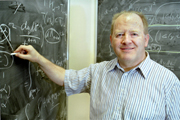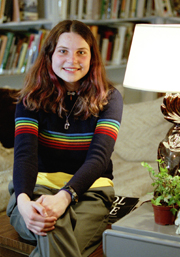
 |

|
|
 |
|
|
|||
|
|
|
|
|
 Jack Fearnley Photo by Andrew Dobrowolskyj |
Retired director Jack Fearnley gets his PhD in mathematics Jack Fearnley has tried to retire, but the lure of a new challenge always brought him back. Now he is about to receive a doctorate in mathematics, at the age of 62. In 1989, Fearnley retired from Air Canada after 30 years to become Concordia’s Director of Computing Services, as it was then known. After he retired from that job in 1994, he started working on his Master’s degree at Concordia. He says academics has always been in his blood. “People used to call me Professor while I was at Air Canada,” he said, smiling. “Before I retired, I knew I wanted to return to academic work later on, but I wasn’t sure what path I would take.” However, he is pleased to have had a variety of experiences in other fields before returning to mathematics. “I think I would have missed a lot by going directly into post-graduate work.” Fearnley’s doctoral work involves number theory and cryptography. “I have always had a love of number theory. Cryptography became important commercially, and it’s related to number theory, so I thought I should learn about elliptic curves.” Fearnley acknowledges that life as a mature student has its challenges. “I took the experience very seriously,” he said. “The great advantage of doing graduate work immediately following the first degree is that all the knowledge is at one’s fingertips. As a mature student, I had to fill a 30-year gap.” Although there was an age gap between Fearnley and his peers, he didn’t mind at all. “I look at new grads today, and I am in awe of their knowledge. I have been to conferences with people from across North America, and there’s an incredible wealth of knowledge. Usually we old guys say it isn’t the way it used to be, but I say it’s better.” After 35 years in the work world, Fearnley said one of the more difficult adjustments was returning to student life. “I found it hard to return to course work with lectures and exams. On the other hand, I really enjoyed the thesis work, and as a mature student, I was able to have a very good relationship with my supervisor.” Professor Hershy Kisilevsky was Fearnley’s advisor for his Master’s and his doctorate. He says Fearnley’s work interested him from the start. “He found experimental evidence for some of the problems I was thinking about,” explained Kisilevsky. “It was surprising how well he was able to turn his work into a really interesting thesis. “It takes a particular kind of individual to give himself back to his interests. Jack must be really motivated to put himself through this, because it’s not easy. I have a lot of respect for him.” Fearnley plans to continue his research at Concordia. “My thesis has lots of theories in it. Kisilevsky wants to investigate them with me, and I’m really looking forward to that,” he said. —JS |
||
 Julie Fowler Photo by Andrew Dobrowolskyj |
Julie Fowler got involved for art’s sake Fishing for funding, writing grant proposals and organizing artists aren’t glamorous, but they are key to setting art projects in motion. Julie Fowler, 24, is getting her degree in art history. During her three years at Concordia, she helped revitalize the fine arts reading room and organized the Art Matters festival last year. Concordia’s Art History Association started the fine arts reading room about 10 years ago. It’s actually called the John Russell Harper Reading Room, after a former Concordia professor and well-known art historian. “When I started, two years ago, it wasn’t in good shape,” Fowler recalled. The roof over the reading room was leaking. There were buckets full of water on the floor and the carpet was stained. It was clear that the room had to either be fixed or closed. As a member of the student council of representatives, Fowler was able to secure $30,000 in start-up funding from the Dean of Students’ Office and funding from the Faculty of Fine Arts. Adding computers, couches and equipment made it more welcoming. “It changed from a small reading room for art history students to a place for all fine arts students to sit and read or relax or use computers,” she said. She learned a lot about working within the system, she said. “Writing proposals, chasing funding and negotiating the system gave me the confidence and learning I needed for Art Matters.” The ambitious art festival, held last year, gave Concordians a chance to display their work prominently on campus, and in the process, visual artists, performers and theorists learned from each other. Now Julie is driving to New Mexico for a vacation, after which she’ll return to her native Vancouver. Originally a visiting student, she fell in love with Montreal and extended her stay. “My time at Concordia has given me a lot of tools,” she said. “Simply being at university isn’t enough to learn these skills. You really have to go out there and get involved.” —JS |
||
Alexis Zoe Porter chooses working in Angola over graduate school Anthropology graduate Alexis Zoe Porter is taking up a new challenge after she delivers her valedictory address to the Arts and Science convocation on June 11. After five months of training in the United States with the International Institute for Co-operation and Development (IICD), she will spend half a year in Angola working with NGOs. She might end up working with HIV/AIDS victims, war orphans or street kids, she’ll go wherever she’s most needed. This came at a cost: turning down a full scholarship to do graduate work at Dalhousie University, in Halifax. Porter has 4.13 GPA (4.3 is perfection). “It was really hard, but after reading about the theory, I wanted to see the practice,” said Porter, who was born in Calgary. “I want to get a sense of the complexity of this world, get my own understanding and then write about it.” Anthropology seems to have been an obvious choice. Porter says she quickly found herself at home in the department, and realized that her extensive travelling experience helped her grasp what anthropology was about. It was there that she learned to deconstruct, analyze and criticize. Her study of Chavurah, which takes its name from a Hebrew word for a group of women who study and pray together, was one of 10 research papers published in Stories of Montreal, by Anthropology professor Louise Gauthier. “Chavurah is a group of Jewish women in their 50s who have reclaimed a ritual,” Porter explained. “I was interested in what you can do today with traditional religions.” For Porter, whose mother is Jewish, it was also a role-modelling experience that reflected her own concern for feminism and spirituality. Tying academic excellence to a determination to go see things for herself, Porter aspires to approach problems of international development from an anthropological perspective. This means looking at the discrepancy between what people’s ideas were and what they turned into, and at the anthropologist’s role and responsibility. Are we there only to observe? she wonders. —MV |